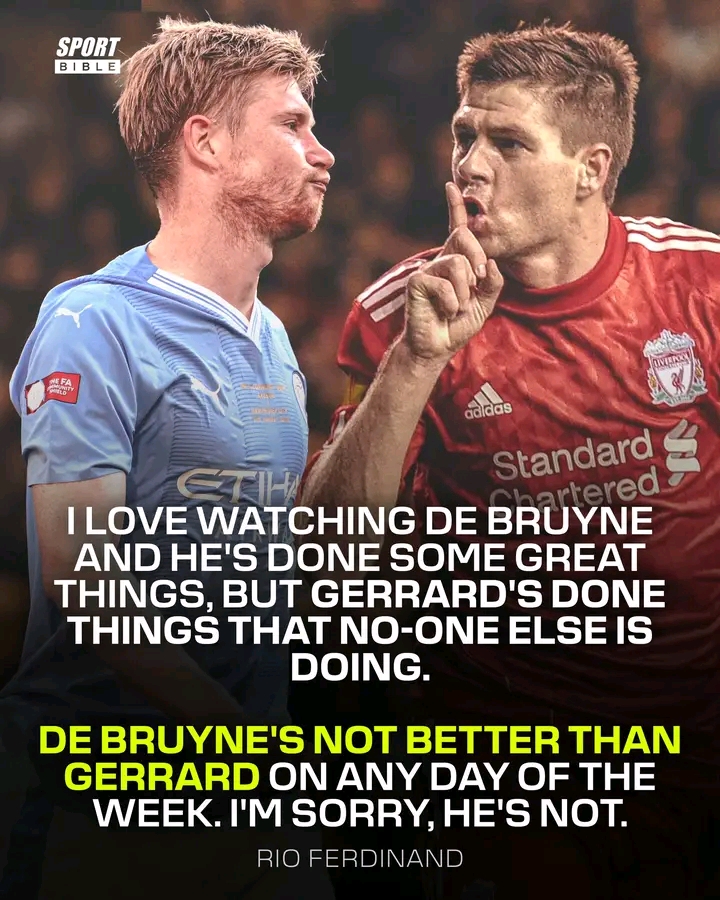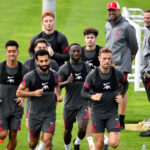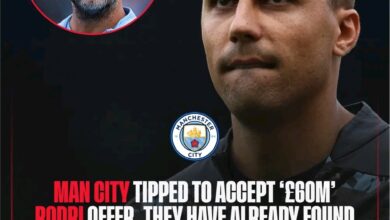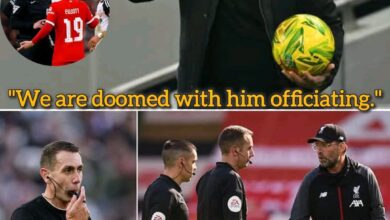Rio Ferdinand leaves host stunned with Kevin De Bruyne vs Steven Gerrard point – ‘He’s not!’

In a bold and contentious claim that has sparked heated debate across football circles, former Manchester United defender Rio Ferdinand has ranked Liverpool legend Steven Gerrard above Kevin De Bruyne among the Premier League’s greatest midfielders. The surprising declaration came during an episode of Ferdinand’s podcast, leaving his co-host visibly stunned and igniting fresh conversations about football legacy as De Bruyne prepares to depart Manchester City
Ferdinand’s controversial rankings emerged as the football world reflects on De Bruyne’s imminent departure from Manchester City at season’s end. The Belgian maestro’s impending exit has naturally prompted discussions about his place among the Premier League’s all-time greats, with Sky Sports analyst Jamie Carragher recently naming him the second-best foreign player in league history, behind only Arsenal legend Thierry Henry.
During an episode of the “Vibe with FIVE” podcast, Ferdinand outlined his own “Midfield Mount Rushmore,” identifying six elite talents who defined Premier League excellence in the middle of the park: Patrick Vieira, Kevin De Bruyne, Frank Lampard, Roy Keane, Steven Gerrard, and Paul Scholes. While acknowledging this exclusive group of talents, Ferdinand then made the startling decision to elevate three names above the rest—with De Bruyne conspicuously missing from his top trio.
“I’m going to say Vieira, Lampard and De Bruyne just miss out,” Ferdinand explained, before revealing his highest-ranked midfielders. “The other one is Gerrard. Yeah, he’s above Kevin De Bruyne.
The statement visibly shocked host Joel Beya, whose animated reaction captured the controversial nature of Ferdinand’s stance. Despite Beya’s protests, the former Manchester United defender remained unmoved, standing firmly behind his assessment.
In justifying his preference for Gerrard over De Bruyne, Ferdinand evoked the iconic British comic strip character “Roy of the Rovers,” suggesting that Gerrard possessed a unique quality that transcended conventional football metrics.
“Just as a player, I love watching De Bruyne and he’s done some great things,” Ferdinand acknowledged. “But Gerrard done things that others… it’s like Roy of the Rovers, no one’s doing that.”
This romantic characterization of Gerrard’s career speaks to the Liverpool icon’s penchant for dramatic interventions and match-winning moments—perhaps most famously exemplified by his heroics in the 2005 Champions League final in Istanbul and his spectacular long-range strikes that repeatedly rescued Liverpool in critical moments.
Ferdinand’s assessment notably sidestepped the often-cited criticism of Gerrard’s career—his failure to win a Premier League title. Instead, the former England defender focused on Gerrard’s intangible quality to produce extraordinary moments under pressure, a trait that has secured his legacy despite that significant gap in his trophy cabinet.
The timing of Ferdinand’s comments is particularly intriguing as De Bruyne’s Manchester City career approaches its conclusion. The Belgian international has been instrumental in City’s era of unprecedented domestic dominance, collecting multiple Premier League titles while establishing himself as perhaps the premier creative force of his generation.
De Bruyne’s vision, passing range, and technical brilliance have redefined the attacking midfielder role in English football. His consistently high assist numbers and ability to dictate games from central areas have made him the orchestrator of Pep Guardiola’s all-conquering City side.
With transfer rumors now swirling about De Bruyne’s next destination—including reports that Manchester City is targeting Nottingham Forest’s Morgan Gibbs-White as a potential replacement, while David Beckham’s Inter Miami is positioned as a possible destination—the discussion around his Premier League legacy takes on added significance.
Ferdinand’s top three of Keane, Scholes, and Gerrard represents a distinctly 2000s-era perspective on Premier League excellence, perhaps reflecting the period when Ferdinand himself dominated English football. Both Keane and Scholes were Ferdinand’s teammates at Manchester United, while Gerrard was a fierce rival during his Liverpool days.
What makes Ferdinand’s selection particularly noteworthy is his willingness to overlook De Bruyne despite the Belgian’s revolutionary impact on the Premier League landscape. With four Premier League titles (and potentially a fifth this season), multiple PFA Player of the Year awards, and statistical achievements that place him among the most productive creative midfielders in league history, De Bruyne’s exclusion from Ferdinand’s top three raises eyebrows.
Ferdinand did suggest that current Manchester City midfielder Rodri might eventually join this elite group, acknowledging the evolving nature of the game and the continuing emergence of world-class talent in Premier League midfields.
The debate between Gerrard and De Bruyne ultimately centers on a philosophical question about how to evaluate midfield excellence. Gerrard represented the complete midfielder—capable of thunderous tackles, long-range strikes, precise free-kicks, leadership, and moments of individual brilliance that could single-handedly change games.
De Bruyne, conversely, epitomizes the modern specialized attacking midfielder—a player whose technical precision, creative vision, and consistent excellence have helped define an era of positional football under Guardiola. His contribution is perhaps more subtle but no less impactful—the architect rather than the action hero.
Ferdinand’s preference for Gerrard might reflect a generational perspective that values the all-action, heart-on-sleeve approach of the Liverpool legend over the more cerebral, systematized brilliance of De Bruyne. It also speaks to the powerful hold that memorable moments have on football consciousness—Gerrard’s spectacular goals against Olympiacos and West Ham in cup finals likely weigh heavily in such evaluations.
As De Bruyne prepares to write the next chapter of his career away from the Premier League, debates about his standing in the pantheon of English football will intensify. Ferdinand’s provocative ranking ensures that the conversation about midfield hierarchies remains vibrant and contested.
For football fans, such debates are the lifeblood of the sport—subjective, passionate, and ultimately unresolvable. While statistics might favor one player and trophies another, the aesthetic and emotional impact of players like Gerrard and De Bruyne transcends simple metrics.
Ferdinand’s willingness to make such a definitive statement, particularly one that runs counter to increasing appreciation for De Bruyne’s revolutionary impact, demonstrates how personal these evaluations remain. Even for professional analysts like Ferdinand, who played alongside and against many of these midfield greats, separating objective assessment from personal preference proves challenging.
As the Premier League continues to evolve and new midfield talents emerge to challenge established hierarchies, the conversation that Ferdinand has reignited will continue to engage football enthusiasts. Whether one favors Gerrard’s “Roy of the Rovers” heroics or De Bruyne’s sustained technical excellence ultimately comes down to individual football philosophy and which aspects of midfield play one values most highly.
What remains clear is that both players have left an indelible mark on English football, and as De Bruyne prepares to conclude his Premier League journey, his departure represents the end of a significant chapter in the league’s rich midfield tradition—one that future generations will measure themselves against, just as they do with Gerrard, Scholes, Keane, Vieira, and Lampard before them.















